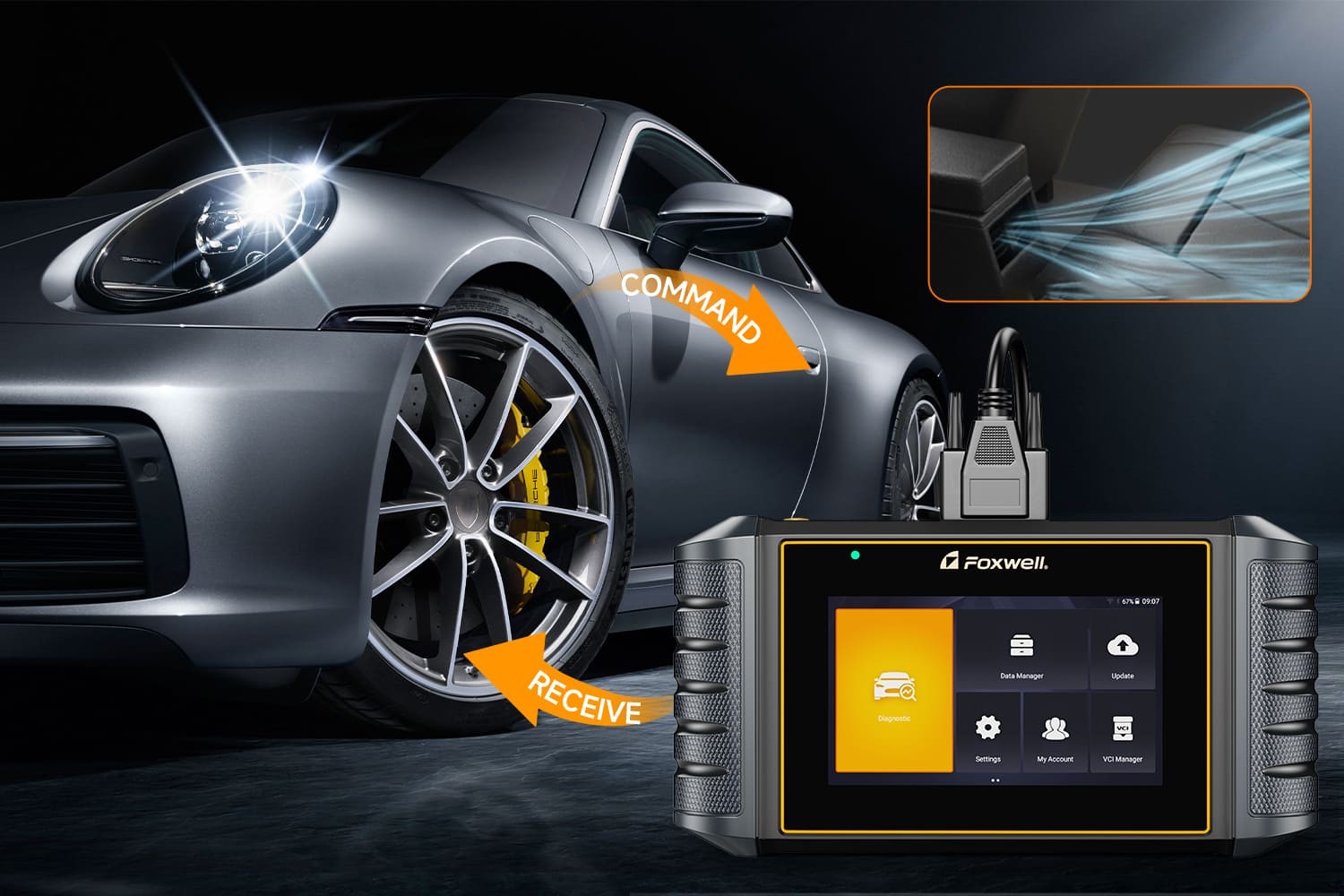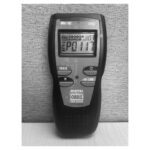OBD2 scanners have revolutionized how car owners and mechanics diagnose and monitor vehicle health. Devices like the Foxwell NT809BT offer real-time insights into your car’s performance and potential issues. A common question among users is: can you use an OBD2 scanner while driving? Let’s explore the advantages, disadvantages, and crucial safety measures to consider when using your OBD2 scanner on the go.
Why Consider Using an OBD2 Scanner While Driving?
Alt text: OBD2 scanner connected to a car’s diagnostic port, displaying real-time data on a smartphone app.
The desire to keep an OBD2 scanner plugged in during drives stems from a need for continuous vehicle monitoring and a deeper understanding of its operation. For many drivers, especially those who are proactive about car maintenance or drive older vehicles, the benefits of real-time data are significant.
Continuous System Monitoring for Enhanced Safety
Imagine driving and being able to constantly monitor critical parameters like engine temperature or transmission fluid temperature. If your vehicle is prone to overheating, having a live OBD2 scanner can provide early warnings, allowing you to safely pull over before serious damage occurs. This proactive approach is far more effective than waiting for a dashboard warning light, which often signals that a problem has already escalated.
Real-Time Data Logging for Diagnostic Accuracy
Real-time data collection while driving is invaluable for diagnosing intermittent issues. Many car problems don’t occur consistently; they might only surface under specific driving conditions. By logging data as you drive, you capture these fleeting moments, making it easier to pinpoint the exact conditions that trigger a fault. This detailed data log becomes incredibly useful when you consult with a mechanic, providing concrete evidence of the issue’s behavior.
Optimizing Fuel Efficiency and Driving Performance
Beyond diagnostics, real-time OBD2 data can help you become a more efficient driver. By monitoring parameters like fuel consumption, throttle position, and engine load in real-time, you can adjust your driving habits to maximize fuel economy. Observing how your driving style impacts these metrics allows for immediate adjustments, leading to potential fuel savings and reduced vehicle wear.
Early Detection of Fault Codes and Alerts
An OBD2 scanner can act as an early warning system for potential problems. Instead of waiting for the check engine light to illuminate – which often happens after a problem has persisted – a scanner can alert you to fault codes the moment they are registered. This immediate notification allows for prompt action, potentially preventing minor issues from turning into major, costly repairs.
Vehicle Customization and Performance Feedback
For car enthusiasts who modify or tune their vehicles, an OBD2 scanner is an essential tool for monitoring the effects of these changes. Whether you’ve installed aftermarket parts or adjusted engine parameters, real-time data from the OBD2 scanner provides immediate feedback on how these modifications are impacting performance and vehicle health, ensuring everything is functioning as expected.
Convenience of Continuous Connection
Modern OBD2 scanners are designed for convenience. Many, like the Foxwell NT809BT, utilize Bluetooth connectivity, allowing them to wirelessly transmit data to your smartphone or tablet. This eliminates the need for bulky wires and constant plugging and unplugging, making continuous monitoring seamless and unobtrusive.
Building a Long-Term Vehicle Health Record
Just as tracking your personal health over time is beneficial, so is monitoring your vehicle’s long-term health. Continuous OBD2 monitoring creates a comprehensive history of your car’s performance and any issues it has encountered. This detailed record can be invaluable for proactive maintenance and can even be a selling point when you decide to resell your vehicle, demonstrating a history of diligent care.
Advantages of Keeping Your OBD2 Scanner Plugged In
Instant Access to Diagnostic Information
Having constant access to your vehicle’s data allows for rapid diagnosis, especially in unexpected situations. Imagine you are on a long drive and your car starts behaving strangely. With a scanner connected, you can instantly check for fault codes and assess if it’s a minor sensor issue or a more serious problem requiring immediate attention. This real-time insight can be the difference between a minor inconvenience and a major breakdown.
Timely Issue Alerts for Preventative Maintenance
Immediate alerts about emerging issues enable you to address problems proactively. For example, if you notice a slight engine hesitation, your OBD2 scanner might immediately flag a misfire, even before the check engine light comes on. Addressing such issues early can prevent them from escalating into more significant and expensive repairs down the line.
Deeper Understanding of Vehicle Operation
Using an OBD2 scanner while driving fosters a better understanding of your vehicle’s behavior under various conditions. You can learn how different driving styles affect fuel consumption, engine temperature, and other vital parameters. This knowledge empowers you to drive more efficiently and potentially extend the lifespan of your vehicle by reducing unnecessary wear and tear.
Potential Drawbacks of Continuous OBD2 Scanner Use
Battery Drain Concerns
One of the primary concerns with leaving an OBD2 scanner plugged in is the potential for battery drain, especially if the vehicle is not driven frequently. OBD2 scanners draw power from the car’s battery, and while the draw is typically minimal, it can become significant over extended periods of inactivity. If you only drive your car occasionally, the scanner could contribute to battery depletion.
Driver Distraction Risks
Real-time data, while beneficial, can also be a source of distraction if not managed responsibly. Constantly glancing at your smartphone or scanner display to monitor data while driving can divert your attention from the road, increasing the risk of accidents. Safe usage requires discipline and prioritizing driving safety above data monitoring.
Potential for Device or System Malfunctions
Although rare, there is a slight risk of an OBD2 scanner malfunctioning or interfering with your car’s electronic systems. Attempting to perform intensive scans while driving, or using a low-quality or incompatible scanner, could potentially disrupt vehicle functions. It’s crucial to use reputable scanners correctly and for their intended purposes to minimize these risks.
Expert Opinions on Driving with OBD2 Scanners
Automotive experts and mechanics generally agree that using an OBD2 scanner while driving is acceptable for short durations but advise caution for prolonged use. They emphasize understanding your vehicle’s electrical system and your driving habits. For daily commuters, continuous monitoring can be advantageous. However, for infrequent drivers, the risk of battery drain becomes a more significant consideration.
Experts also stress the importance of avoiding driver distraction. They strongly advise against interacting with the scanner or its display while the vehicle is in motion. Data review should be reserved for when the car is safely parked. Furthermore, while modern vehicles and quality scanners are designed to minimize interference, experts acknowledge a slight potential risk of system glitches, especially with older or less reliable scanners.
Safety Guidelines and Best Practices
To maximize the benefits and minimize the risks of using an OBD2 scanner while driving, adhere to these best practices:
- Choose Reputable Scanner Brands: Invest in high-quality OBD2 scanners from well-known brands. Reliable devices are less likely to cause electrical issues and provide more accurate data.
- Monitor Battery Condition: Regularly check your car battery’s health, particularly if you plan to leave the scanner plugged in continuously. If you don’t drive daily, consider disconnecting the scanner to prevent potential battery drain.
- Minimize Driver Distraction: Absolutely avoid interacting with the scanner or viewing data while driving. Set up your scanner to provide only non-intrusive alerts, and review detailed data only when safely parked.
- Keep Firmware and Software Updated: Ensure your OBD2 scanner’s firmware and any associated apps are up to date. Updates often include bug fixes and performance improvements that enhance compatibility and reliability.
- Integrate Scanner Data into Regular Maintenance: Use the data collected by your OBD2 scanner to inform your routine vehicle maintenance. Tracking data trends over time can help you identify and address potential issues proactively.
Alt text: Foxwell OBD2 scanner displaying full system diagnostic functions on a touchscreen interface.
In Conclusion
Yes, you can use an OBD2 scanner while driving, and it offers valuable benefits, including real-time diagnostics and early issue detection. However, it’s crucial to be aware of potential drawbacks like battery drain and driver distraction. By following safety precautions, choosing reliable equipment, and using the data responsibly, you can leverage the power of continuous OBD2 monitoring to enhance your driving experience and vehicle maintenance. Always prioritize safe driving practices and consider your specific needs and driving habits when deciding whether to keep your OBD2 scanner plugged in while driving.
If you have more questions or need further guidance, don’t hesitate to ask!
FAQs:
Is it safe to drive with an OBD2 scanner constantly connected?
Generally, yes, driving with an OBD2 scanner plugged in is safe, provided the device is functioning correctly and doesn’t impede your driving.
Will leaving my OBD2 scanner plugged in drain my car’s battery?
Modern OBD2 scanners are designed to consume minimal power and are unlikely to cause significant battery drain in regularly driven vehicles.
Can an OBD2 scanner potentially damage my vehicle?
No, OBD2 scanners are designed to safely communicate with your car’s computer system and should not cause damage when used correctly and according to the manufacturer’s instructions.

